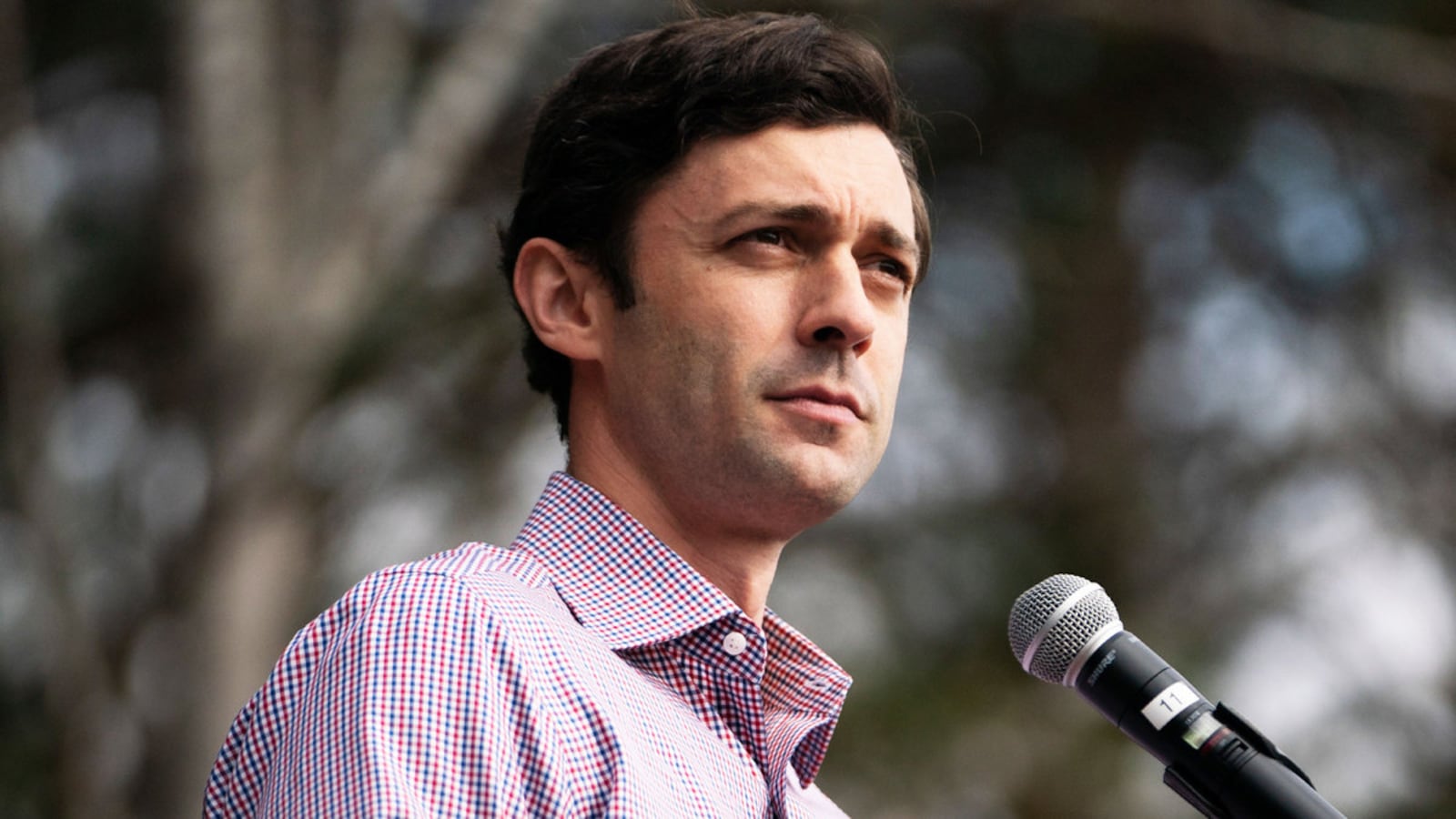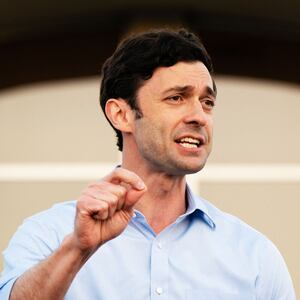ATLANTA—When a 30-year old named Jon Ossoff burst onto the national political scene in 2017, he didn’t talk much about Donald Trump.
Running in the first major special election of the Trump era—in the same district that Newt Gingrich once held—Ossoff conspicuously avoided attacks on the then new president. He presented himself as a centrist, not a #Resistance liberal; a candidate more worried about wasteful government spending than Trump.
More than three years after that defeat, the candidate once called the “high priest” of civility by The Washington Post has switched up his sermon. Where he once pulled his punches on Trump, Ossoff—now facing Sen. David Perdue (R-GA) in a runoff race with control of the U.S. Senate on the line—frames Democrats’ all-important Georgia campaign as a way to stop “a figure like Donald Trump” from “attain[ing] power by simply threatening to burn it all down.”
And it’s not just Trump he’s targeting in sharp terms, but Trumpism as well.
“I think that leadership like Donald Trump's only grows out of soil that’s already been poisoned,” Ossoff said in a Tuesday interview with The Daily Beast, after a campaign event in downtown Atlanta. “So these races are about whether this incoming administration in the next Congress will have the capacity to govern and enact legislation that serves the interests of working families, and whether we can get things done that helps people will determine whether down the road, there's a resurgence of reactionary, right-wing extremism.”
The change in Ossoff’s rhetoric doesn’t just show his evolution as a candidate. It also reflects how dramatically the political terrain has shifted in Georgia, and nationwide, over four years of Trump in the White House.
On his way to the White House, Joe Biden carried Georgia by 12,000 votes, the first win by a Democratic presidential candidate here since 1992. He won the Sixth Congressional District that Ossoff lost in 2017 by an 11-point margin; Democratic Rep. Lucy McBath has now twice defeated Karen Handel, the Republican who first beat Ossoff there.
To win in Georgia, Ossoff and Raphael Warnock—the minister challenging Sen. Kelly Loeffler (R-GA)—are betting on the new formula, not the one that seemed ripe for 2017 or the Republican-lite playbook employed for decades by southern Democrats. Those who know Ossoff well say they wished he’d done this earlier.
“I think what’s happened with Jon from his original run to now, he has really found his authentic voice and who he is, and not just what the consultant class perceives he needs to be,” said state Sen. Jen Jordan, a Democrat whose district falls within the Sixth Congressional and a friend of Ossoff’s. “The maturation from the congressional race to now—and he was a good congressional candidate—the maturation has been really incredible to watch,” she said.
Rep. Hank Johnson (D-GA), Ossoff’s former boss on Capitol Hill, said his onetime aide relied on consultants too heavily in his 2017 run, “but this time, he has called all of the shots.”
“He’s been a hands-on candidate,” Johnson told The Daily Beast. “He hasn't left this campaign in the hands of anyone other than himself.”
The question now is whether the 33-year old can steer himself to victory in what might be the most intensely-hyped Senate campaign in recent history. He is seen as having a tougher race than Warnock, who is running against Loeffler, an appointed senator whose short tenure in office has been marked by controversy over her financial dealings. Perdue, first elected in 2014, has a name brand in Georgia politics—his cousin, Sonny, was a two-term governor—and nearly avoided a runoff against Ossoff by coming close to getting 50 percent of the vote in the November general election.
But Ossoff is seeking to make up ground as a GOP civil war unfolds. Since Nov. 3, Trump has fixated on Georgia as ground zero for his election loss, sewing widespread distrust in the state’s election system, hammering GOP elected officials, and prompting alarm in the party that his most devoted supporters may stay home in the January runoff.
“What you're starting to see now is some Republicans peeking their heads over the parapet as the dust clears on the presidential and saying hey, we just took the worst beating for an incumbent president seeking reelection since Roosevelt crushed Hoover in 1932, maybe the vise grip that the Trump family has on the GOP is not sustainable electorally or sensible,” said Ossoff. “I want to urge folks within the GOP who recognize Trumpism as a dead end and bad for the country to speak out now that he's been defeated.”
But while Ossoff may speak more freely and critically of the Republican Party in the age of Trump, he insists that he isn’t closing the door on working with its members. The Democrat said there may be bipartisan energy to rethink key economic policies, and suggested he’d make it a priority to work with GOP senators on that front—specifically mentioning Sen. Josh Hawley (R-MO), an avowed Trumpist who has nevertheless been the loudest Republican voice pushing for $2,000 direct checks as part of a coronavirus relief bill.
“There are some folks, I think in the Senate, including perhaps Mr. Hawley, who see that there may actually be a bipartisan coalition that can be built to rethink some of this stuff,” said Ossoff.
Should he be elected, Ossoff would likely enter a Senate narrowly in Democratic control. And, for that very reason, his vote would be immensely important to any legislative or confirmation effort before the chamber.
To his critics, he is seen as a rubber stamp for Joe Biden. And during his 2020 campaign, Ossoff made it clear that he would be a staunch ally of the incoming president. He has welcomed Biden’s presence on the campaign trail, and his ads and stump speeches emphasize that his win would make Biden’s agenda possible.
But Ossoff still stressed that his critics are wrong. With the caution that has defined much of his political rise, he portrays himself as someone who would not march with his party. “Sitting in the United States Senate, the incoming administration needs to understand that I'll take an adversarial approach, where it's appropriate, and I'm not just gonna be a partisan soldier,” he said.
Ossoff argued that he’d be a force pressuring Biden on a variety of matters, saying he’d be “critical and public” if Biden doesn’t embrace reforms on climate change, campaign finance, economic policy, government ethics, and other areas.
When pressed on where he disagreed with Biden, Ossoff didn’t name any specific area of divergence. But he did express concern over the Biden administration’s direction in a few general areas, particularly on financial regulation and fiscal policy. The former vice president, himself seen as friendly to major financial institutions, has not filled his Cabinet and administration with figures poised to take a confrontational stance toward Wall Street, in the eyes of some on the party’s left wing. People on Wall Street have been “delighted” at Biden’s selections, a Goldman Sachs executive told Bloomberg.
“I'm concerned about the influence that the financial services industry may have in the coming years and with the incoming administration,” said Ossoff. “I do not want to continue business as usual, where economic stimulus and efforts to support economic growth are principally about subsidizing the financial services industry.”
Though Ossoff has tried to cast off the shadows of his first run for office, he can’t go far on the campaign trail without escaping the political moment that launched him.
At an “Artists for Ossoff” event in Atlanta’s Little Five Points neighborhood on Sunday, Ossoff’s audience included some of his earliest supporters. One of them, Deb Powell, a beer distributor from suburban Johns Creek, recalled the early days of 2017 when her group of “suburban housewives” held a meet and greet for Ossoff. They expected “maybe” five people; 135 showed up.
“It’s full circle for us,” Powell told The Daily Beast. “He’s doing great. We’re excited to work for him.”
Jordan, the Democratic state senator who Ossoff campaigned for in her own special election in 2017, said that race was instructive—not just for her, but for others, and clearly, for Ossoff, too.
It showed her that he was capable of running for higher office and doing it under an intense spotlight. When D.C. Democrats asked her opinion in 2019 on who could take on Perdue, Jordan had a quick answer.
“Everyone assumed that Ossoff wouldn't be able to pull it off, but I was never that person,” she said. “I said if anyone would pull it off, it’d be Jon.”
Indeed, perhaps no single Democrat in the Trump era has taken as much incoming as Ossoff. In 2017, Republican groups spent over $16 million going after him as a silver-spoon resume-padder with no business being in Congress.
Like Ossoff’s approach, their playbook has changed, too. In 2020, outside GOP groups—which have booked $61 million in attack ads against Ossoff—have gone all-in on a strategy to paint him as a far-left Chinese Communist Party sympathizer.
Despite Republican cracks that Ossoff is a flimsy empty suit, they are clearly not underestimating him, said Brian Robinson, a GOP strategist in Georgia. “They’re not belittling him in paid advertising,” he told The Daily Beast. “The campaigns have shown that they know Georgia is competitive, and that beating any Democrat who's well funded is a serious challenge.” Ossoff raised over $106 million from Oct. 15 to Dec. 16.
Robinson also noted that despite his frequent appearances on TV, the relentlessly on-message Ossoff has given up little fodder for attack ads. “Look at what Republicans have cut and published—it’s not quotes from Ossoff, it’s quotes from AOC, Chuck Schumer,” he said.
A previous attack ad from Perdue was edited to make Ossoff, a Jew, look like he had a bigger nose. Perdue’s campaign said it was an accident. But at their only debate, in October, Ossoff savaged Perdue for playing to anti-Semitic tropes; the GOP senator later skipped a scheduled Dec. 6 debate.
Ossoff linked those ads to the ads Republicans have run against Warnock, which he and others have called “racist.” A former intern to the late Rep. John Lewis, Ossoff cast it as part of a longstanding strategy to “to prevent the emergence of a multiracial coalition that demands equal economic opportunity and access to health care.”
“This is the Old South versus the New South,” said Ossoff of the GOP ads. “I mean it's so predictable and tiresome. And it doesn't at this point appear to me that it's effective."







